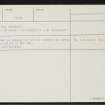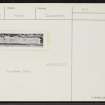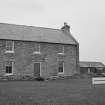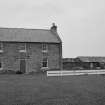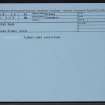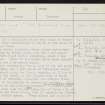Pricing Change
New pricing for orders of material from this site will come into place shortly. Charges for supply of digital images, digitisation on demand, prints and licensing will be altered.
Brodgar Farm
Carved Stone (Early Bronze Age), Cist(S) (Early Bronze Age), Inhumation(S) (Early Bronze Age), Rune Inscribed Stone (Norse)
Site Name Brodgar Farm
Classification Carved Stone (Early Bronze Age), Cist(S) (Early Bronze Age), Inhumation(S) (Early Bronze Age), Rune Inscribed Stone (Norse)
Alternative Name(s) House Of Brogar
Canmore ID 2111
Site Number HY31SW 25
NGR HY 302 129
NGR Description HY c. 302 129
Datum OSGB36 - NGR
Permalink http://canmore.org.uk/site/2111
- Council Orkney Islands
- Parish Stenness
- Former Region Orkney Islands Area
- Former District Orkney
- Former County Orkney
Ness of Brodgar, Orkney, runic inscription fragment
Measurements: L 0.41m, W 0.15m, H 0.10m
Stone type: sandstone
Place of discovery: HY c 302 129
Present location: National Museums Scotland, Edinburgh (X.IB.211).
Evidence for discovery: found reused in a field wall on Brodgar Farm in or before 1927 when it was presented to NMAS.
Present condition: broken and worn.
Description
This irregular fragment bears incised twig runes but the inscription is difficult to interpret.
Date: uncertain.
References: Barnes & Page 2006, OR 7, 172-4.
Compiled by A Ritchie 2017
HY31SW 25 c. 302 129.
Six short cists and a sculptured stone were found in February 1925 in the field immediately to the SE of the house of Brogar, on Brodgar farm. Five of the cists, including three joined end-to-end and separated only by single slabs, and one 6 ins square and 1 ft deep, were found during ploughing, about 6 ins below the surface. Three of the larger cists each contained unburnt bones and waterworn stone.
'Outside, but overlapping the E. ends of the two large cists in the centre, was a flat stone of triangular shape, 2 ft 6 ins in length along the front, tapering to 2 3/4 ins at the back, and 3 3/4 ins thick, on the longest side of which were eight bands of chevrons, lozenges, and oblique lines, resembling some of the designs on Bronze Age pottery. This last stone is now in the National Museum.' (J G Marwick 1926; Proc Soc Antiq Scot 1928; H Marwick 1925). A saddle-quern is also said to have been found. (Accession no. of Stone - IA 44)
A sixth cist was later found, five ft beneath the others, containing only reddish ashes. 'Many stones had to be removed before it was reached.'
H Marwick 1925; J G Marwick 1926; Proc Soc Antiq Scot 1928; RCAHMS 1946.
The present farmer at Brodgar could only verify the siting to the field centred at HY 302 129.
No further information.
Visited by OS (NKB) 11 May 1966.
Orkney Smr Note (February 2006)
Excavations started in this area in 2004 and are continuing. Check detailed records.
Information from Orkney SMR
Note (2020)
Brodgar Farm
This burial site in Orkney Islands was a focus for funerary practices in the Bronze Age period, between 2200 BC and 1501 BC.
Prehistoric Grave Goods project site ID: 60066
CANMORE ID: 2111
Total no. graves with grave goods: 3
Total no. people with grave goods: 3
Total no. grave goods: 3
Prehistoric Grave Goods project Grave ID: 60033
Grave type: Cist
Burial type(s): Inhumation
Grave good: Pebble
Materials used: Stone (Uncertain/Unspecified)
Current museum location: Unknown
Prehistoric Grave Goods project Grave ID: 72329
Grave type: Cist
Burial type(s): Inhumation
Grave good: Pebble
Materials used: Stone (Uncertain/Unspecified)
Current museum location: Unknown
Prehistoric Grave Goods project Grave ID: 72330
Grave type: Cist
Burial type(s): Inhumation
Grave good: Pebble
Materials used: Stone (Uncertain/Unspecified)
Current museum location: Unknown
Further details, the full project database and downloads of project publications can be found here: https://doi.org/10.5284/1052206
An accessible visualisation of the database can be found here: http://blogs.reading.ac.uk/grave-goods/map/












